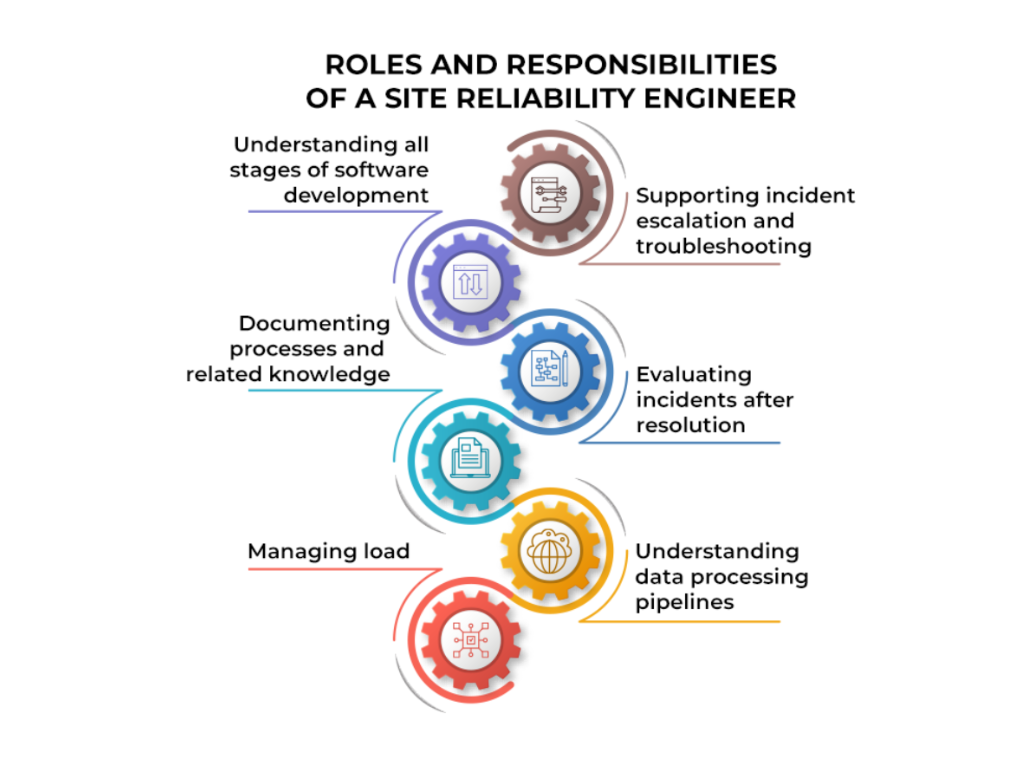
When it comes to choosing DevOps vs SRE, people often view DevOps and Site Reliability Engineer (SRE) as two compartments competing. However, these two go hand-in-hand. Over a long period of time, development and operations teams have worked separately without knowing each other’s languages. With this increased gap, it became difficult to manage tasks without understanding each other.
This is why a DevOps Engineer plays a significant role in the software development cycle of a program or application. This has allowed the development teams to write codes efficiently and faster, and at the same time, allowed IT operations teams to push the code faster for software delivery.
If we talk about Site Reliability Engineer vs. DevOps, even an SRE works in the software compartment, however, on the operations side. It is important to understand the two in-depth for a thorough understanding of both of them.
This blog is a great introduction to DevOps and Site Reliability Engineer for those who want to understand the difference between DevOps and SRE. You will learn what are DevOps and SRE, what are the benefits of the two, what the DevOps Engineer and SRE do, and lastly, which one is better.
To know the answer to all these above-mentioned questions, read the blog till the end!
What is DevOps?
DevOps is a combination of the words ‘Dev’ and ‘Ops.’ Dev stands for developer or development team, and Ops is for operations or operations team. The DevOps concept is the collaboration of development and operations teams to generate an innovative product with enhanced features. These capabilities are beneficial in real-world use situations, such as faster time to market, high-quality code, and so on.
In other words, DevOps involves the building of tools for product management and involves development of software for product management. When we hear the term “DevOps engineer,” automation is the first thing that comes to mind. However, a DevOps engineer is responsible for much more than that. He is an expert who can speed up the software development process. A DevOps Engineer is familiar with both software development and IT operations as a result. The process of application release and product development is then accelerated by him using automation.
What are the benefits of DevOps?
The DevOps practice is a combination of developmental roles such as writing codes using version-controlled systems, and building and running tests over the code. The operations team then carries out the release process by pushing the code to the server. This whole process provisions a reliable software delivery efficiently.
The benefits of DevOps are mentioned below:
- Reductions in organizational problems:
There could be an enhancement in the collaboration of teams by breaking down the barriers by using DevOps technology.
- Reduction in human error:
As DevOps introduces automation into the system that a lot less chance of committing any errors. This makes the system a lot more reliable and efficient.
- Implementation of gradual change:
Once changes are made in an incremental manner, it is easier to navigate through the bugs in the code. This makes the process of bucking a lot less time-consuming and gives DevOps Engineer an edge over a conventional software developer.
- Reduction in costs:
As DevOPS has already been introduced as so with the tools that are necessary to build and test the code in the software life cycle process, there is a reduction in the code building process expenditure. Therefore, it is an efficient way to run the software development cycle quickly.
A strategy like DevOps can be used for any kind of project. It can be utilized in any setting, whether the office or the field, for both big and little jobs. It is a versatile strategy that can be applied to any project, including those in the fields of software development, web development, and even medicine.
NOTE: Do you want to become a DevOps engineer from scratch? Here, are the steps – Link
DevOps vs SRE Responsibilities
Here, are the roles and responsibilities of DevOps and Site Reliability engineer.
What is the role of a DevOps Engineer?
The following are the main goals of a DevOps Engineer are mentioned below:
- Improvement in site stability:
A DevOps engineer’s job is to improve the security, scalability, and efficiency of the current software infrastructure. This can be accomplished by making software development, deployment, and maintenance processes better. A DevOps Engineer also works to make the software as bug-free as possible.
- Efficient performance:
A DevOps engineer is essential to the efficient running of IT and software development operations.
- Bridging the team gap:
He acts as a link for communication between the development and operations teams, bridging the gap between them.
- Automating tasks:
He simplifies operations and automates manual tasks to increase team efficiency.
- Efficient problem-solving:
He continuously employs a variety of monitoring tools and tactics to keep an eye on the teams under his direction. This guarantees quick problem-solving and effective application/product delivery.
- Improvement in business results:
As he implements new techniques and technologies to promote improved business outcomes, he serves as the team’s chief innovator in terms of software development and IT operations.
NOTE: Know how to start your DevOps career by clicking on this Link
What is SRE?
Site Reliability Engineer (SRE) is another face of the same coin, the software lifecycle. In contrast to a DevOps Engineer, SRE focuses on the operations part of the software delivery cycle. SRE aims to develop trustworthy, scalable systems that guarantee the highest level of reliability.
Operating system administration, project management, issue handling, and even emergency management are among the IT management responsibilities that Site Reliability Engineering (SRE) uses software development to handle. Traditionally, these responsibilities would be handled by system administrators.
By identifying and fixing issues early in the development process, SRE aims to lower the likelihood of failure. Continuous testing, which SRE emphasizes, guarantees that the system is reliable even when it is not in use. Agile development, which pushes developers to continuously test and improve their software, includes SRE as a major element. Early problem detection and resolution during development is accomplished using SRE, which ensures that the system is reliable even when not in use.
What are the benefits of SRE?
An SRE plays a significant role in a business organization to keep the website up and running. He makes sure that the site is made available and reliable all the time. It is made sure that only the correct data remains on the site with the ability to scale up and remain secure.
The following are the benefits of an SRE:
- Smooth site performance:
By spotting problems early so that they can be repaired before they become a problem, site reliability engineering can help to enhance performance.
- Reduction in downtime:
As the key goal of an SRE is to keep the site up and running, there is a significant reduction in the downtime faced by a site.
- Improvement in security:
SRE works to design and build the most secure systems that are of top-notch responsiveness and automate the system administration task single-handedly.
What is the role of a Site Reliability Engineer (SRE)?

The following are the major roles played by a SRE:
- Keep the site up-and-running:
The general condition of a site is the responsibility of site reliability engineers. They are entrusted with making sure the site can run continuously with little downtime.
- Repairing sites:
The upkeep and repair of the site’s infrastructure is the responsibility of the site reliability engineers. Engineers for site dependability are also in charge of spotting and resolving any potential problems.
- Binding up the operations and development:
SRE contributes to the creation of the operational context for production support systems. So for a single system, operations and development collaborate. SRE doesn’t aim to establish a single source of truth; instead, it concentrates on service delivery.
- Conducting regular surveys:
To gather input, the team also conducts surveys on a regular basis. This makes it possible for engineers to find and repair issues. Executives can also monitor the number of issues the team has resolved to get a sense of how well the team is performing.
- Testing new software:
In order to make sure new software versions are as bug-free as possible, SREs closely collaborate with the QA team to test them against the production environment. The SRE team also creates documentation and offers instruction on the latest technologies and methods.
DevOps vs SRE: What's the Difference?
The key difference between DevOps Engineer and SRE are mentioned as follows:
DevOps Engineer | Site Reliability Engineer (SRE) |
The DevOps philosophy involves the practice of bridging the gap between the software development and IT operations teams. | A SRE works to design and build fault-tolerable, reliable, and scalable sites to streamline the development process in the product management process. |
There are cross-functional teams involved (software development and IT operations). | A lot more teams related to the project management process to implement and build design. |
DevOps involves fixing the code pushing, building, testing and releasing processes using CI/CD pipelines. | SRE is a concrete class that implements DevOps. |
DevOps area of expertise is working in the development side of product management. | SREs work on the building and operations side of product development. |
The productivity of the application delivery process is improved by using DevOps tools and automation. | SREs look up for tools that can reduce the time involved in operations to be run manually. |
DevOps is more of a cultural and philosophical application as it bridges the gap between two cross-functional teams. | SRE involves more of a realistic approach as it involves working on the operations side as system administrators do manually. |
Agile software development projects are the most popular use cases for DevOps. | Lean infrastructure practices involve using SRE approaches. |
The aim is to ease down the process of communication between the software development and IT operations teams to enable quick software/app delivery. | The aim is to build a system that can be managed by a few groups of skilled engineers. |
Automation tools such as Ansible, Chef, and Puppet are used to scale up the DevOps practices. | Scripting languages such as Python and Bash are used. No other automation tools can be used. |
Small incremental changes are introduced so that the software bugs can be fixed quickly. | Small versions are tested before rolling out the complete major version. |
Bugs are debugged in the final stages while testing the code. | The core development team fixes the bugs that are not fixed by the SRE team itself. |
Everything is measured in DevOps, from the time taken to push the code to customer satisfaction. | KPIs are measured in SRE. |
NOTE: Learn the top skills required to become a DevOps engineer.
Which is better: DevOps vs SRE?
It turns out that DevOps and SRE aren’t two competing methods, but rather close friends designed to help break down organizational communication barriers to deliver better software faster.
The major difference between DevOps Engineer and SRE is that DevOps removes barriers to allow communication between software development and operations teams for faster software delivery. SRE, on the other hand, involves multiple teams that share product ownership to design and implement sites.
None of them is better than each other. To conclude, DevOps vs SRE both have their own applications and collide together in a beautiful way to enhance the software development process in a business organization.
NOTE: Understand the journey of a DevOps Engineer in this roadmap
Conclusion
SRE and DevOps Engineers represent very significant roles in business organizations, especially in the software development process. Although there are many key differences between the two roles, both of them sit perfectly for running a successful business model.
This blog includes a beginner-friendly introduction to DevOps vs SRE. The key differences between the two have also been discussed. If you’re confused about which one you should choose, go with the one that you’re more interested in.
NOTE: Ace Your Interview with these Top DevOps Interview Question and Answers.


